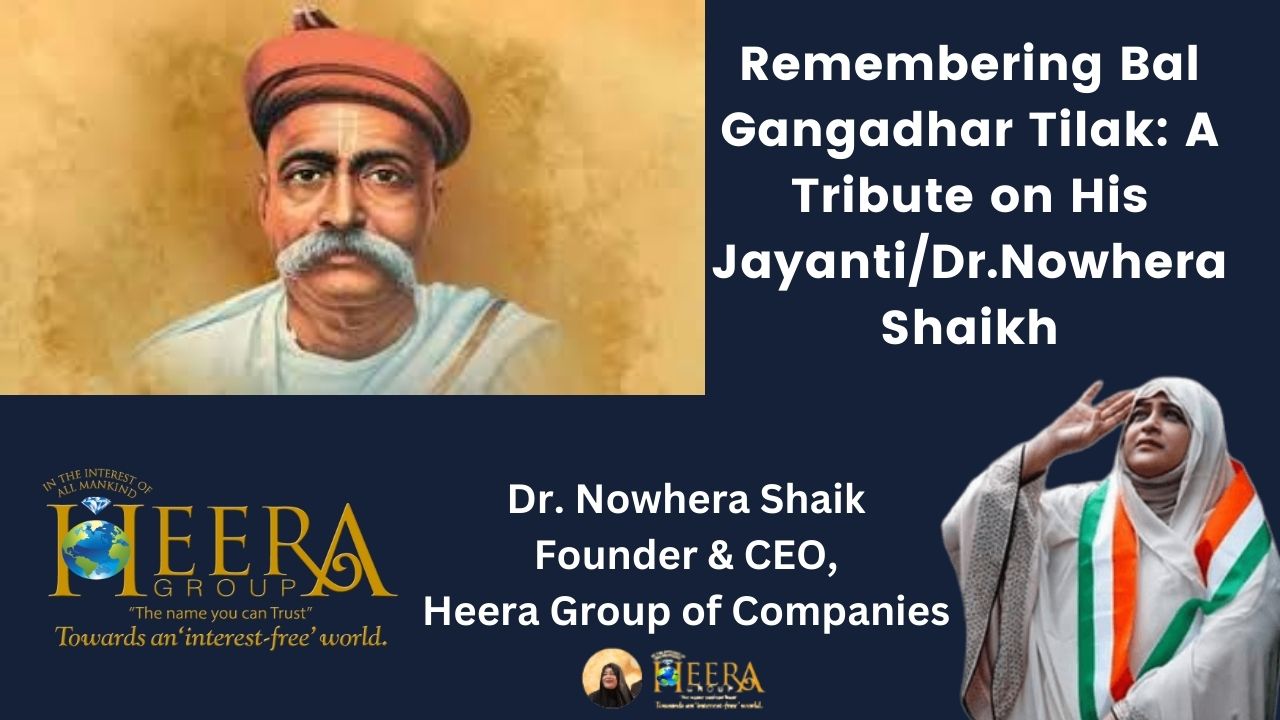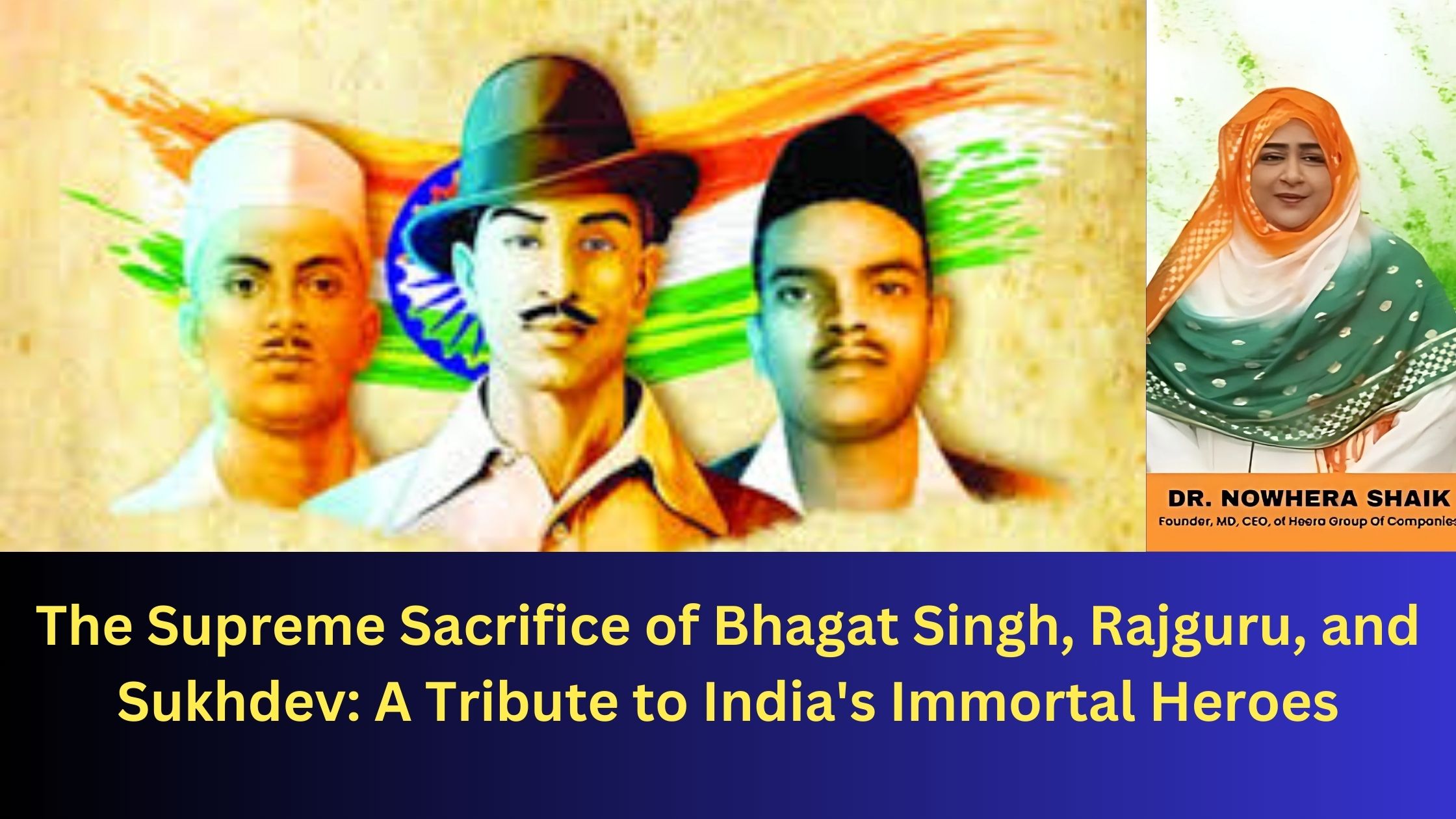- 22july1947
- A Message Dr. Nowhera Shaik
- allindia mahilaempowerment party
- Amit Shah ji
- andhrapradesh
- balagangadharatilak
- Birthday
- Business
- Congratulatory
- flaghoisting
- heeragroup
- heeragroupceo
- india
- indian president
- indianfreedomfighters
- indianhistory
- indianindependence
- Journey
- Message to the Prime Minister
- modi ji
- nationalemblem
- nowhera shaikh
- nowherashaikh
- Politics
- victory
- womenempowerment
Remembering Bal Gangadhar Tilak: A Tribute on His Jayanti/Dr.Nowhera Shaikh

Bal Gangadhar Tilak Jayanti: Celebrating the Life of India’s Freedom Fighter
Today is Balagangadhara Tilak Jayanti, a day to honor one of India’s most prominent freedom fighters and social reformers. Born on July 23, 1856, in Ratnagiri, Maharashtra, Bal Gangadhar Tilak left an indelible mark on India’s struggle for independence and social progress. Often referred to as the “Father of Indian Unrest,” Tilak’s life and work continue to inspire generations of Indians.
Early Life and Education
Balagangadhara Tilak was born into a Chitpavan Brahmin family in Ratnagiri, Maharashtra. From an early age, he showed exceptional intelligence and a keen interest in mathematics and Sanskrit. Tilak’s educational journey took him to Pune, where he completed his education at Deccan College, graduating with a bachelor’s degree in mathematics and Sanskrit in 1876.
His academic prowess and social consciousness laid the foundation for his future role as a national hero of India. Tilak’s early years were marked by a deep understanding of Indian culture and a growing awareness of the injustices perpetrated by British colonial rule.
Social Reforms and Journalism
Tilak is known as a great social reformer who worked tirelessly to bring about positive changes in Indian society. One of his notable initiatives was to encourage widow remarriages, challenging the prevailing social norms of the time. This progressive stance demonstrated Tilak’s commitment to social justice and equality.
In his efforts to bring consciousness to society, Tilak established two influential newspapers:
- Kesari (in Marathi)
- Maratha (in English)
These publications served as powerful tools to awaken the masses and spread awareness about social and political issues. Through his journalism, Tilak critiqued British policies, advocated for social reforms, and kindled the spirit of nationalism among Indians.
Political Career and Home Rule League
Tilak’s political career was marked by his unwavering commitment to India’s freedom struggle. His famous declaration, “Swaraj is my birthright, and I shall have it,” became a rallying cry for the independence movement. This bold statement against British rule earned him the title of “Lokmanya” (beloved leader of the people).
In 1916, Tilak founded the Home Rule League, a significant milestone in India’s journey towards self-governance. The League’s objectives included:
- Promoting self-government within the British Empire
- Increasing Indian participation in the administration
- Fostering political awareness among the masses
The Home Rule movement gained considerable traction, paving the way for future nationalist movements and contributing to the eventual independence of India.
Legacy and Impact
Bal Gangadhar Tilak’s contributions to India’s freedom struggle and social reform are immeasurable. His legacy continues to inspire Indians across generations. Some key aspects of his impact include:
- Pioneering the concept of Swaraj (self-rule)
- Reviving pride in Indian culture and traditions
- Promoting education and social reforms
- Inspiring future leaders of the Indian independence movement
Tilak’s life and work serve as a testament to the power of dedication, intellect, and unwavering commitment to one’s principles.
Tilak’s Relevance Today
As we celebrate Balagangadhara Tilak Jayanti, it’s crucial to reflect on the relevance of his ideas in contemporary India. Tilak’s emphasis on self-reliance, cultural pride, and social reform resonates strongly with modern India’s aspirations.
In the words of Dr. Nowhera Shaik, Founder & CEO of Heera Group of Companies, “Tilak’s vision of a self-reliant and socially progressive India continues to guide us. His life teaches us the importance of combining tradition with modernity, and the power of education in bringing about social change.”
Learn more about Bal Gangadhar Tilak’s life and contributions
As we remember this great son of India, let’s draw inspiration from his courage, intellect, and unwavering commitment to social justice and national freedom. Tilak’s legacy serves as a guiding light for all those working towards a stronger, more inclusive India.
How can we apply Tilak’s principles in our lives today? Share your thoughts in the comments below and join the conversation about this great Indian leader’s enduring impact.



